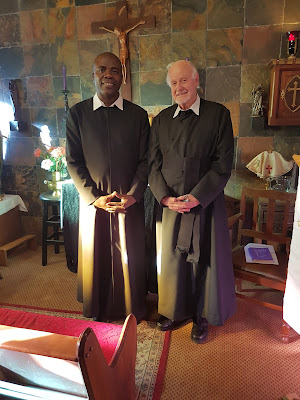 We are sometimes told that Catholic
devotion to the mother of Jesus is effusive and unbiblical. It is worthwhile,
then, on today’s feast, to see what scripture has to say about Mary. For if
ever the Mother of Jesus were spoken of in effusive terms, it is in the first
chapter of Luke’s Gospel.
We are sometimes told that Catholic
devotion to the mother of Jesus is effusive and unbiblical. It is worthwhile,
then, on today’s feast, to see what scripture has to say about Mary. For if
ever the Mother of Jesus were spoken of in effusive terms, it is in the first
chapter of Luke’s Gospel.
The very first words addressed to Mary
in scripture are uttered, not by a human, but by an angel, a powerful heavenly messenger who bears a message from the
Throne of God itself. The message begins thus: “Rejoice, you who have been
filled with grace! The Lord is with you!” Strong language indeed for an angel to address to a human.
The angel describes Mary as having
been already filled with grace. And filled with grace implies sinlessness; for where someone is filled with grace, can there be any room for
sin? The angel greets the mother-to-be of Jesus as a vessel of grace, already prepared to receive in her womb
the Saviour of the world.
The angel says further: “The Lord is with you.” Israel, of which Mary is a
daughter, had at that time been waiting
for the coming of the Saviour for many centuries, for the Day of the Lord, when
Israel would be vindicated and blessed with all manner of good things. With
Mary, there is no question of a future
coming; the Lord is already with
Mary. The decisive coming of the Lord has already
taken place in her life.
Mary’s Visitation to Elizabeth is
further evidence of the extreme terms which the Scriptures accord her. As she
arrives, the first human to acknowledge her arrival is an unborn child. Just as John the Baptist was later to go before Jesus
to the world in his ministry, so he is already in the womb the first to
recognise and proclaim Jesus’ coming. In the light of this, the millions of "terminations" of pregnancy carried out every day in the world should be sobering.
Note the words of Elizabeth: “You are blessed amongst women.” This does not
mean “one blessed woman amongst other blessed women,” so much as “Out of all
women, you are the one who has been
blessed.” And the action of the unborn John as he “leapt for joy” within his
mother’s womb as both are filled with the Holy Spirit.
All the strong terms by which Mary is
described or addressed in these scriptures point to Mary as a model of discipleship. “I am the handmaid of the Lord; let it be done to me
as you have said,” are her words to the angel, words of utter submission to God’s
will and purpose for her. At Cana in Galilee her advice is to “do whatever he
tells you.” All the revelations she hears about Jesus she “ponders in her
heart.” Even in his agony on the cross, she is present, never losing faith or
hope in God.
At her last appearance in Scripture,
she is amongst the apostles in the Upper Room, patiently awaiting the coming of
the Holy Spirit and the birth of the Church. Mary, the perfect disciple and
model for all disciples, points the way not
to herself, but to Jesus.
Let us give thanks today for the friend,
intercessor and model Jesus has given us in his mother, who loves us, and whom
Christians through all ages have loved even as they have listened to in her
words: “Do whatever He tells you.”
Fr Phillip


















